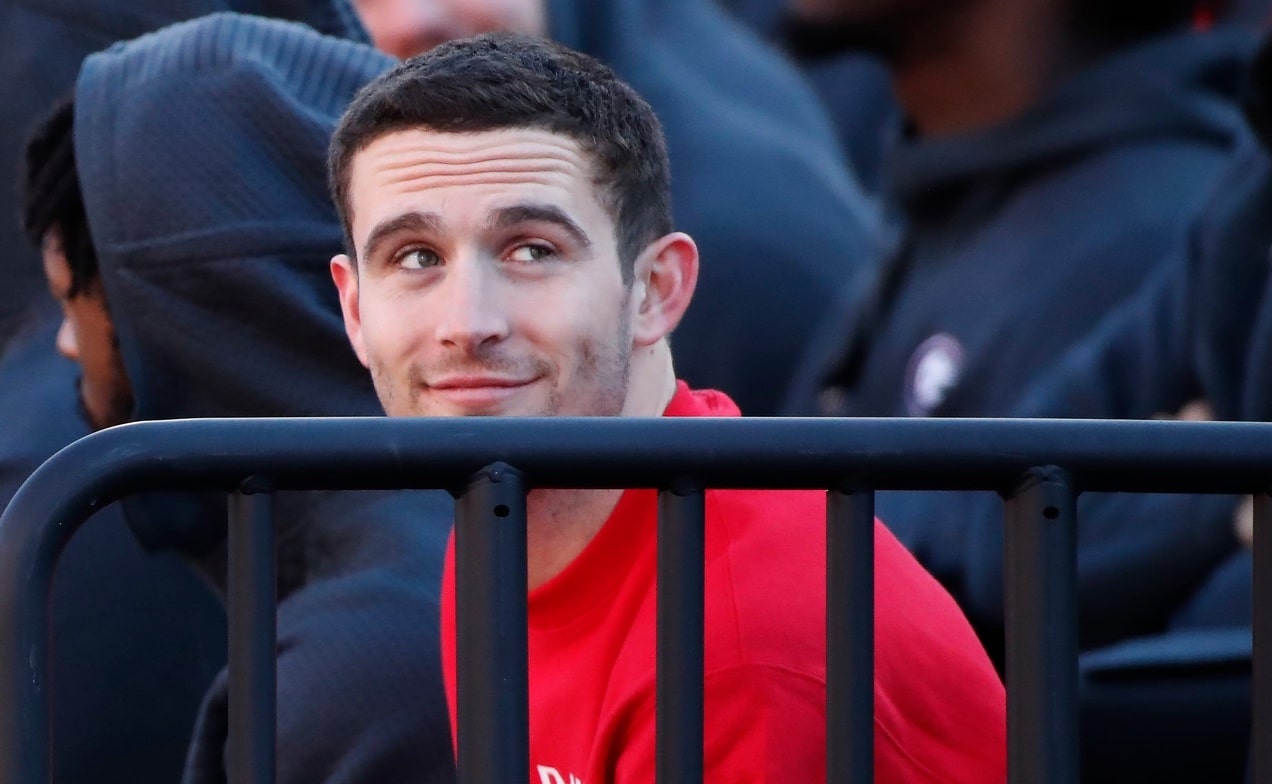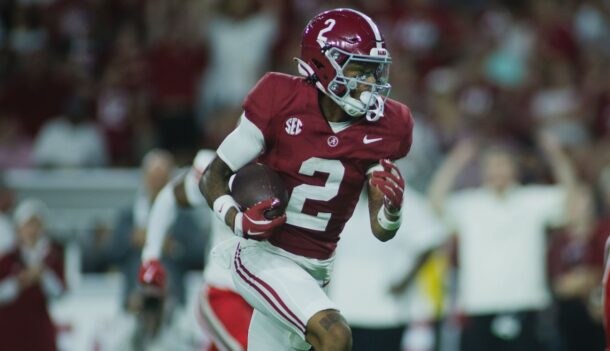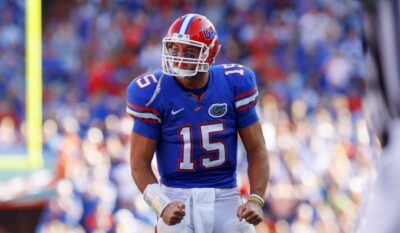
No College Football Hall of Fame eligibility for Stetson Bennett? A prerequisite needs tweaking for him and others
If nothing changes, you’ll never see Stetson Bennett IV even show up on the ballot for the College Football Hall of Fame.
As in, the dude who just led Georgia to consecutive College Football Playoff National Championships and became just the 3rd quarterback to repeat this century and the 4th quarterback to do that in the last 4 decades. The man who has not 1, not 2, not 3, but 4 offensive MVP awards in Playoff games can never even get a seat at the table to have his College Football Hall of Fame eligibility considered.
Why? This is the very first rule of College Football Hall of Fame eligibility:
“First and foremost, a player must have received First Team All-America recognition by a selector organization that is recognized by the NCAA and utilized to comprise their consensus All-America teams.”
In Bennett’s 46 years in college (give or take), he was never named a first-team All-American. At least he wasn’t by any sort of organization that’s recognized by the NCAA that’s used to comprise consensus All-America teams. Mind you, those are all decided before the postseason begins. As in, before Bennett had a 6-touchdown performance in the most lopsided Playoff/BCS game ever, which helped Georgia clinch its 2nd consecutive national title.
In some ways, that makes sense, especially in this era. We’ve now got coaches leaving before bowl games, as well as opt-outs and transfers that can impact a player’s postseason performance, which could ultimately impact their credentials for first-team All-America status. In other ways, though, it’s silly to think that a player who accomplished what Bennett just did in the postseason won’t have that factor into his résumé for earning All-America honors.
But tweaking that would depend on those organizations all getting on the same page and changing that, which doesn’t feel likely.
There’s a different tweak that needs to be made which would have a much more direct impact on the Hall of Fame ballot process. Instead of limiting it just to first-team All-Americans, the NFF should add in the caveat that states “OR if a player was invited to New York for the Heisman Trophy ceremony.”
Simple. Sort of.
It’s simple in that you’re still upholding the prestige of the “.02%” (that’s the percentage of players who earn enshrinement). Getting to New York is a massive challenge, and it’s not as if adding that caveat would open the floodgates for hundreds of other candidates to suddenly be eligible. It would open the door for someone like Bennett, who earned a trip to New York, though not without controversy.
While Bennett had his skeptics — many from Tennessee — for making it to New York, what many failed to acknowledge was that against teams that were in the AP Top 25 heading into the postseason, he had a quarterback rating of 185.27. That was 6th among all Playoff-era quarterbacks (min. 4 games). And again, that was before he led the Ohio State comeback (189.2 QB rating) and the TCU rout (226.9 QB rating).
Bennett is the reason the rule needs tweaking. You cannot tell the story of college football without him. And for everyone who thinks he was just AJ McCarron or Greg McElroy, Bennett had more games with a quarterback rating of 180.0 against AP Top 25 teams in his last 2 seasons (8 of 11 opportunities) than those 2 Alabama quarterbacks combined in their last 2 seasons (7 of 25 opportunities). The irony is that McCarron actually earned AFCA first-team All-America honors in 2013 and he’ll be eligible to appear on the HOF ballot.
If your response is “well, why change the rule just for Bennett?” tell me this: How many players in college football history have a postseason résumé as good as Bennett’s? There’s certainly nobody in the Playoff era. Even a great like Deshaun Watson never had a single Playoff game with a quarterback rating better than 160.0 (add in the rushing and Bennett still had more total touchdowns than Watson).
But this isn’t about Bennett vs. Watson. Besides, Watson will be eligible as a former first-team All-American. Watson’s off-field conduct will be debated by virtue of the 3rd Hall of Fame prerequisite, which states “his post-football record as a citizen is also weighed. He must have proven himself worthy as a citizen, carrying the ideals of football forward into his relations with his community and fellow man.”
Barring some sort of future issue, that won’t be an issue for Bennett, despite his low wave count at Georgia’s victory parade.
The reality is that it took someone like Bennett to magnify how silly it is that the Heisman voting has no bearing on the Hall of Fame, and that it doesn’t factor in any postseason performance. He’s not alone in this odd Hall of Fame exclusion, either.
Take Drew Brees. The former Purdue quarterback finished 3rd in the 2000 Heisman Trophy voting. But that year, fellow quarterbacks Josh Heupel and Chris Weinke finished ahead of him in the voting and they swept all of the NCAA-recognized first-team All-America honors.
Oh. My bad. Georgia Tech quarterback George Godsey somehow earned Pro Football Weekly’s All-America honor.
That meant Brees, who had the Big Ten’s 3 most prolific passing seasons ever by the time his college career was finished, was never even eligible to earn a spot on the ballot to have his credentials debated.
The same was true of Eli Manning, who finished 3rd in the 2003 Heisman Trophy voting but was behind Oklahoma quarterback Jason White on all of the NCAA’s recognized first-team All-America squads. Manning won the Maxwell Award as the best player in college football, yet by virtue of the “first-team All-America” caveat, his candidacy was non-existent.
That’s just strange.
It’s not strange that there’s a pretty hard and fast prerequisite for eligibility. You have to narrow the field in a sport with thousands of new candidates every year. It makes sense to draw the line in the sand somewhere, even if it means there are some odd snubs like Nick Chubb and Ken Stabler, neither of whom ever finished in the top 10 of the Heisman voting and are ineligible because they didn’t make an NCAA-recognized first-team All-America squad.
But adding the Heisman invitee caveat feels long overdue. Maybe there wasn’t a serious push to tweak the prerequisites for Brees or Manning because they were 2 of the most decorated pro quarterbacks of the 21st century. They’ll likely hear their names called in Canton at the Pro Football Hall of Fame someday, which is considered the ultimate individual football accomplishment.
For Bennett, though, it’s not crazy to suggest that his best football moment is probably in the rearview mirror. And if it is, that shouldn’t somehow take away from what he meant to the sport. Tommie Frazier never sniffed the NFL, but you can’t tell the story of college football in the 20th century without him. Hence, why he was inducted into the College Football Hall of Fame in 2013 (it surprisingly took him 7 years after he became eligible).
Frazier at least had his résumé debated (the NFF, as well as athletics directors, coaches and members of CoSIDA have the final vote). If nothing changes, Bennett won’t even get that opportunity. We don’t even know if Bennett would have enough support to earn enshrinement. Say what you want about him. The guy at least deserves a chance at some college football immortality.
Well, let’s rephrase that. Bennett deserves a chance at some individual college football immortality. Lord knows he delivered Georgia more college football immortality than anyone could’ve ever imagined.
See, it’s not that hard to make a tweak.
Connor O'Gara is the senior national columnist for Saturday Down South. He's a member of the Football Writers Association of America. After spending his entire life living in B1G country, he moved to the South in 2015.







